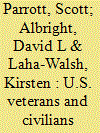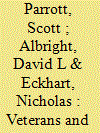|
|
|
Sort Order |
|
|
|
Items / Page
|
|
|
|
|
|
|
| Srl | Item |
| 1 |
ID:
169100


|
|
|
|
|
| Summary/Abstract |
Commenters often criticize the mass media for providing audiences a narrow and inaccurate representation of U.S. military veterans. This study examined the claim by researching how regional news publications in the 50 states represented veterans on Twitter. A quantitative content analysis documented the presence or absence of characteristics in 1,460 tweets that employed the terms veteran or veterans. Data were examined using cluster analysis. Three frames emerged. The most prevalent frame, labeled charity, highlighted instances in which veterans received assistance from charitable organizations and others. The second frame, hero, contained references to honor, World War II, and content that would elicit pride from audience members. The third frame, victim, highlighted the mistreatment of veterans by the military and/or society, mental health issues, politics, and the Gulf War. Results suggest U.S. news consumers are provided a narrow representation of what it means to be a veteran.
|
|
|
|
|
|
|
|
|
|
|
|
|
|
|
|
| 2 |
ID:
190785


|
|
|
|
|
| Summary/Abstract |
The news media often portray military veterans in stereotypical ways, providing audiences narrow representations in which veterans are traumatized heroes. What happens when a veteran sees these storylines and assumes they affect how the public thinks about veterans? This question informs this study, which used a two-prong approach (online, telephone) to survey 1,047 American adults about news media and veterans. Respondents, including veterans and civilians, were asked to recall news stories about veterans, assess the quality of news coverage of veterans, and offer opinions concerning whether news coverage affects themselves and other people. When respondents could recall a news story about veterans, they described stereotypical stories related to victimization/harm, heroism, charity/social support, mental illness, and violence. Respondents, both civilian and veteran, described news coverage as mediocre and felt the news affects other people more than themselves.
|
|
|
|
|
|
|
|
|
|
|
|
|
|
|
|
| 3 |
ID:
186340


|
|
|
|
|
| Summary/Abstract |
The mass media are an important source of information concerning military service personnel and veterans. Veterans, veterans organizations, and others have criticized the mass media for providing the public shallow representations of veterans and military service in which veterans are heroes traumatized mentally and/or physically by their service. Despite the concern, scant research has empirically examined how exposure to such content affects public perceptions of veterans. Using an experiment, this study examined how exposure to news stories of military veterans informed thoughts, attitudes, and support intentions toward veterans. Results suggest short, one-time exposure to stereotypical news stories can lead readers to perceive an increased likelihood veterans will experience post-traumatic stress disorder and, in turn, feel less desire to be socially close with veterans. However, exposure to a story that challenges stereotypical representations of veterans appears to mitigate the effect. In addition, news exposure can influence support intentions related to veterans.
|
|
|
|
|
|
|
|
|
|
|
|
|
|
|
|
|
|
|
|
|